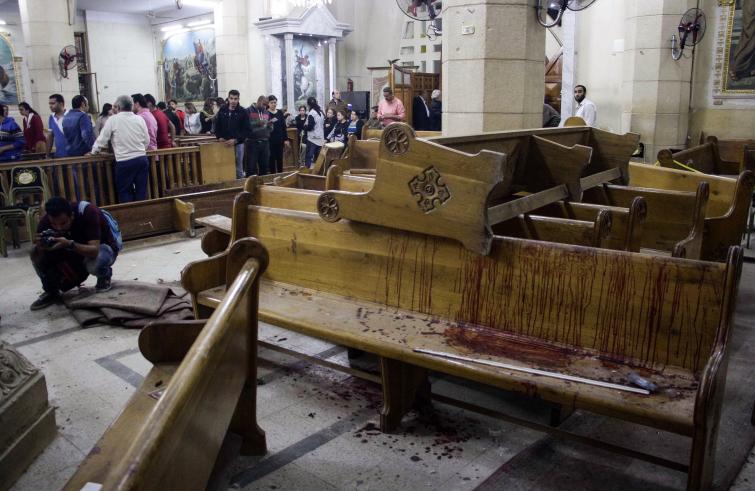
The Via Crucis is also here. It passes through St. Mark’s Cathedral in Cairo, in the Abbasseya district, seat of Egypt’s Coptic Orthodox Patriarchate, home to the small Christian minority that in this huge Country of sand, history and Nile, represents less than 10% of the local population. This is where on December 11 2016 12 kilos of TNT were detonated in the chapel of St. Peter and Boutrosseya where Mass was being celebrated. It took the lives of 25 people, including 6 children. 35 were left wounded. Their faces are still there, depicted on a giant poster placed at the entrance of the chapel. They are not the “victims of terrorism”, as they are defined in Europe, but martyrs. It’s 7 p.m., probably offices’ closing-time, the cathedral is crowded with faithful: men, women and children. A continuous coming and going, although inside and outside the controls are tight. Searches, metal detectors, policemen armed with machine guns and bullet-proof vests have become part of every-day life in this cross-section of humanity. Images of terror – rubble, torn bodies, weeping women – unfortunately did not end in 2016. Even the following year, 2017, delivered a hard blow to Egypt’s Christian-Coptic community: according to figures released by the Associated Press, at least 100 people were killed and hundreds were left wounded since December 2016. The bloodiest attack, claimed by ISIS, took place on Palm Sunday. The first explosions occurred ,during Mass in the church of St. George in Tanta, north of Cairo, followed by the terror attack in St. Mark’s cathedral in Alexandria. More deaths, more martyrs. Orthodox Copts celebrate Easter on Sunday April 8, as enshrined in the Julian calendar. The churches will be filled again. Security level will be raised to alert. SIR flew to Cairo and asked for a meeting with Pope Tawadros II, head of the Coptic Orthodox Church and Patriarch of Alexandria.

Your Holiness, for Christians, Easter is the victory of life over the darkness of death. What does it mean to live this celebration in a land so hardly hit by terrorism? The Holy Cross was not the last step, nor was Jesus’ death, that we celebrate on Good Friday, it was the end. Life was born on the Day of the Resurrection of Jesus Christ. The Cross is made of two parts. The horizontal plane represents the earth: it’s the cross of passion and suffering. The vertical plane represents the relationship between the earth and the Sky: it symbolizes hope. That is why we firmly hold onto the Cross: it’s our Hope and
This Cross incorporates all the passion and suffering of the world.
The dark forces of death are always at work in human history, as you have sadly experienced. You have suffered a long trail of blood. Terrorism struck against your churches and it continues claiming the lives of many also in Europe. We cherish the hope that all martyrs fallen in the attacks are in heaven. The Cross acts like a bridge between heaven and earth. We believe that these martyrs have gone to the opposite shores of the sea and never interrupted their relationship with us. They reached the shore of eternal life, that never ends. This gives us great hope and joy.
You are the spiritual Father of the Coptic-Orthodox community. During Easter celebrations the churches will be crowded with people. Aren’t you afraid for the security of the faithful? Our feeling – which is the same all year round – is that we’re in the hands of the Lord. We’re in the hands of God who has loved and keeps loving all human beings and operates for our own good. God is judge. Both death and life are in his hands. What we can do is to pray and work for the establishment of peace. We pray to be bestowed the gift of peace and that it may spread across the globe.

We were told that Coptic-Orthodox Christians, especially those who lost a family member or a friend in the attacks, have forgiven their murderers. How is it possible to forgive after having experienced so much suffering? The most important thing is to stand on foundations of love, and love knows no end or restrictions. We love humankind. We act as Jesus did. It’s written in the Holy Bible. God loved all humankind until the end. And if we love every person with this measure we should also pray for every human person. In the Lord’s Prayer we say: “Forgive us our debts, as we also have forgiven our debtors.” When our hearts are filled with so much love, when our prayers are sincere, when we believe in the Lord’s forgiveness,
We have a special strength that enables us to forgive those who hurt us, including those who made us victims of painful attacks.
It’s not easy… That is why we invoke the strength of the Holy Spirit.
You have recently met with Saudi Arabia’s Prince who for the first time asked for a private audience here in Cairo. You then took part in an international conference on Jerusalem organized by al-Azhar University. What beams of hope do you see for Egypt and for the Middle East? The points of convergence between leaders, and above all among religious leaders, the permanent and continuous dialogue, the participation in common initiatives that must always be based on love and respect: we believe that all these factors are essential for building peace everywhere. Ancient Coptic traditions speak of love in the following terms:: you should take off your shoes when you talk about God. Only a faith of this kind can defeat terrorism and sin.
The new cathedral that will be built in Cairo is very important for Coptic Christians. The “Nativity of Christ” cathedral is located in Egypt’s new administrative capital. What does it mean for you to have such a prestigious place of worship in the heart of Egypt? This cathedral was commissioned by President Abd al-Fattah al-Sisi. A mosque will be built beside it- constructions are already under way. It
Represents the new expression of equal rights of Muslims and Christians.
This new criteria will be applied throughout villages nationwide. During the 2017 Christmas celebrations President al-Sisi announced the building of the cathedral and as promised, a year later, on Christmas eve 2018, we inaugurated the first portion of this cathedral and celebrated Holy Mass. I personally go there to celebrate Mass every Friday. Two weeks ago one of our bishops went there and almost one thousand people attended the service.
Pope Francis: how are your relations after the Holy Father’s visit in Cairo? His visit was a blessing not only for our Church but for all of Egypt. I remember his meetings with the President, with the Great Imam, with us and with the Catholic Community. They were all highly significant meetings. To me, the common ecumenical prayer we held here together in memory of our martyrs was the most important event of the visit. It was both a spiritual and symbolic event that expresses our yearning to concretize Jesus’ prayer for unity. It’s an important step along the path of our journey. Our contacts with the Holy Father for the theological dialogues undertaken so far and in participation to conferences organized in the Vatican, as the Synod for Young People, are constant and uninterrupted. Also the relations with the Catholic Church in Egypt, through the Council of Churches, are good and continuous. With Pope Francis we also talk over the phone.
National elections are under way. What are your hopes for Egypt? Presidential elections are always a very important opportunity for all Egyptians to express love for their homeland. That’s why voter participation is important. The President-in-office is extremely popular and the population at large wants him re-elected to complete two crucial battles in the history of modern Egypt. First of all, terrorism and violence: a war that Egypt is fighting worldwide. The second challenge involves development and progress, which equally affects the global domain: Egypt’s stability is a guarantee of stability for the entire world.”













